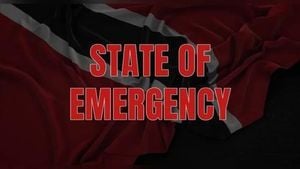Bogdan Święczkowski, the newly appointed head of Poland’s Constitutional Tribunal, has made explosive accusations against Prime Minister Donald Tusk, claiming he and other senior officials are conspiring as part of an "organised criminal group" to stage a coup d'état. This unprecedented declaration has escalated the already intense political and judicial crisis engulfing Poland.
During a press conference on February 5, 2025, Święczkowski announced he had submitted a 60-page notification to investigators at the end of January. He asserts this document details suspicions of serious crimes including efforts to unlawfully alter the constitutional structure of Poland, with specific actions allegedly commencing on December 13, 2023.
"W Polsce realizowany jest zamach stanu," Święczkowski declared, translating to "A coup d'état is being carried out in Poland." He pointed to key figures, including Tusk and various influential government ministers, as suspected participants within what he describes as a corrupt initiative aimed at undermining the functions of Poland's constitutional bodies, including the Constitutional Tribunal, the National Council of the Judiciary (KRS), and the Supreme Court.
Święczkowski's notification outlines how these officials purportedly acted with the aim of curtailing the authority of these institutions and stopping the proper functioning of the judicial system. Among his claims is the assertion these actions were executed as part of organized, deliberate tactics to invalidate the authority of judicial appointments made during the previous government.
He remarked, "Mamy do czynienia ze stanem, w którym prawo w ogóle przestało obowiązywać," meaning "We are dealing with a situation where the law has completely ceased to exist," showing the urgency of his intervention during this deepening constitutional crisis. The situation is compounded by Poland's fraught political history, where significant tensions between government branches and various judicial reforms have led to accusations of illegitimacy against the Tribunal itself.
Deputy Prosecutor General Michał Ostrowski, also appointed during the previous administration, has initiated the investigative process, which could lead to severe judicial outcomes for those implicated, including potential prison sentences. Each charge carries significant penalties under Polish law for anyone who conspires to undermine the constitutional order of the state.
The reactions to Święczkowski's bombshell have been sharply split. Tusk, rather than responding with seriousness, dismissed the accusation with lighthearted scorn, remarking, "Give it a rest, we have serious issues to deal with here," as he recorded himself playing table tennis on social media, indicating the absurdity he attributes to Święczkowski's claims.
On the contrary, leading members of the ruling Law and Justice (PiS) party welcomed the investigation. Wisely calculating the political atmosphere, PiS leader Jarosław Kaczyński proclaimed, "Mamy do czynienia ze stanem, w którym prawo w ogóle przestało obowiązywać," echoing Święczkowski's sentiments and asserting the current coalition has fundamentally disrupted Poland's rule of law by acting against the Constitution.
Indeed, Kaczyński expressed satisfaction with the initiation of this inquiry, reinforcing PiS's consistent position of confrontation with Tusk's administration, which they accuse of seizing control over public institutions and disregarding court rulings. His acknowledgment of Święczkowski’s actions as justifiable reflects the broader strategy of PiS to galvanize their base amid progressive political challenges.
This scandal is only the latest development in Poland’s volatile political theatre, where the future of the Constitutional Tribunal hangs perilously. The judiciary's longstanding normative authority has suffered greatly, prompting accusations from both sides of political divides about the legality and morality of their actions.
Poland's constitutional crisis remains deep, highlighted by accusations of judicial overreach, and political maneuvering often reminiscent of tumultuous power struggles. Whether Święczkowski's charges serve as the catalyst for broader legal consequences or simply fuel political theater remains to be seen. Nonetheless, as tensions between Premier Tusk and his government against the backdrop of judicial unrest play out, the emphasis on law and governance has never been so contested. The potential ramifications of these investigations could reverberate throughout the country's political and judicial institutions, with each faction determined to stake their claim to legitimacy.



